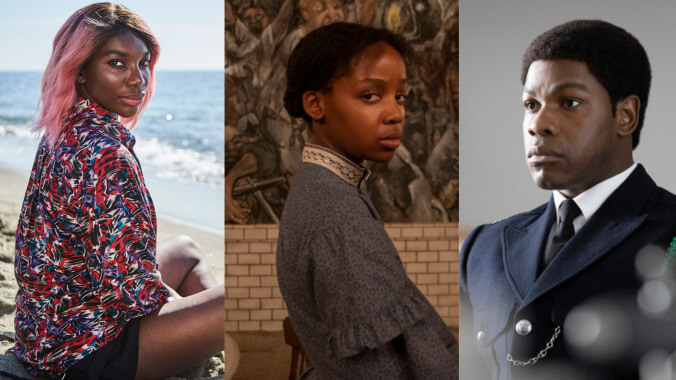The Emmys shouldn’t let I May Destroy You, Small Axe, and The Underground Railroad’s groundbreaking achievements be overshadowed
The limited series race will be tighter than ever at this year’s Emmys, thanks to Black storytellers

Before Netflix’s The Queen’s Gambit nabbed the Golden Globes for Best Actress and Best Miniseries or TV Film, awards recognition seemed almost inevitable. Soon after its October 2020 premiere, the story of troubled chess prodigy Beth Harmon dominated social media feeds, became the streaming platform’s most-watched scripted limited series, catapulted Anya Taylor-Joy into another level of stardom, and even sparked a renewed interest in the game of chess itself. A few months later, HBO scored its own hotly discussed darling with crime drama Mare Of Easttown, which kept star Kate Winslet and her Delco accent in the spotlight until well after the finale.
Both The Queen’s Gambit and Mare Of Easttown have retaken their shared place at the center of conversation as the Academy of Television Arts and Sciences prepares to announce this year’s crop of Primetime Emmy Awards nominees. With high-quality production and popularity to boot, the two dramas and their leading women are considered frontrunners in the Emmys race, and deservedly so. But when it comes to the perennially stacked Outstanding Limited or Anthology Series category, the Television Academy has a real chance to recognize the ways that these series flexed the medium’s malleability. Series like Amazon Prime Video’s The Underground Railroad and Small Axe and HBO’s I May Destroy You challenged the status quo by placing often buried stories of Black life squarely at their respective centers while confirming Michaela Coel, John Boyega, Thuso Mbedu, William Jackson Harper, and Shaun Parkes as talents to watch. These works weren’t just wins for inclusion, however. By cleverly pushing creative boundaries, these shows confronted longstanding (and ill-informed) notions of TV’s alleged inferiority to cinema with breathtaking production and meaty narratives.
This is especially the case for Steve McQueen’s ambitious execution of Small Axe, the five-part anthology consisting of separate films showcasing Black British existence. Rather than commit to a more rigid, occasionally limiting one-hour serial format—an approach that would more than likely support only one story—McQueen stayed true to his filmmaking roots to create a more in-depth tapestry of the West Indian community’s impact on the U.K. Small Axe’s Mangrove, Lovers Rock, Red, White And Blue, Alex Wheatle, and Education offer unique glimpses into parts of Britain’s history that are commonly swept under the rug. What’s more, each installment thrived under Shabier Kirchner’s nurturing cinematography, turning seemingly innocuous occurrences like falling bowls or dancing at a party into moments of total anxiety or vibrant life, respectively. The overall approach was certainly different for TV, but it highlighted the quality that lies just outside of convention.
Barry Jenkins also channeled his big-screen sensibilities into The Underground Railroad, an adaptation of Colson Whitehead’s 2017 Pulitzer Prize-winning novel. Reimagining the safe passage used by enslaved people to escape the South as a literal underground railroad required serious vision. Jenkins delivered as much with a work that recognized the inherent trauma of Black American history while leaning into powerful, cerebral imagery to illustrate the horrors of slavery. Just as 2020 Emmy winner Watchmen masterfully channeled generational trauma into high sci-fi fantasy, the Amazon original excels by getting to the heart of America’s ugly history with striking illusions and a cast that holds nothing back.
Not all of the past year’s innovation stems from the visual. In the case of I May Destroy You, Michaela Coel dug into her own experience with sexual assault to tell a well-rounded story about the multilayered concept of consent. Outfitted with a sharp cast and veracious writing, Coel’s insightful series reclaimed a narrative often used reductively in entertainment to strip female characters of their power and turned out a real story about the difficult business of healing. As Arabella, Coel gave audiences a survivor who was impacted by her identities as a Black woman, an influencer, and an artist, resulting in realistic moments of performative healing and struggles with her hypervisibility. It’s that thoughtfulness that ultimately fed a show that didn’t reduce victimhood to hopelessness, nor did it paint proactiveness as the cure-all for holding rapists accountable. IMDY doesn’t just illustrate rape culture, but exposes how our society paints both survivors and long-touted solutions with a single brush.
Of course, there were other limited series that were similarly praised throughout the industry this past year for their creativity. Disney+’s WandaVision was obviously an unstoppable hit for its spin on classic Marvel storytelling. And while Halston didn’t exactly live up to Ryan Murphy’s usual penchant for glamour and elevated drama, it’s still a Murphy project, which tends to catch the Television Academy’s eye regardless. The Queen’s Gambit and Mare Of Easttown certainly haven’t lost any of their luster. That said, there’s an underlying fear that the Emmys will fumble an opportunity to recognize work that we haven’t seen time and time again. For better or worse, we’ve already seen the troubled prodigy and the struggling investigator. We’ve witnessed the power of Marvel and period dramas through a well-worn Murphy-esque lens. What we haven’t seen often enough are shows that broaden the idea of which stories are worth telling. There’s plenty of great TV, especially within a hotly contested category such as Outstanding Limited or Anthology Series. But there are only so many chances to award creativity that pushes the medium—and its audience—forward. In that race, the real contenders are shows like Small Axe, I May Destroy You, and The Underground Railroad.